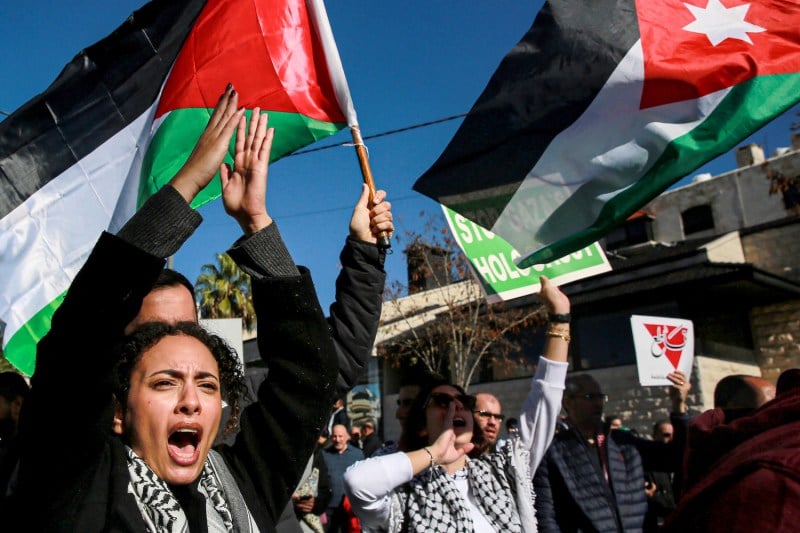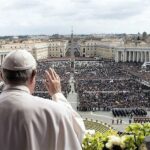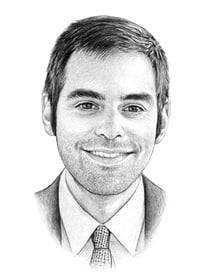Israeli Attacks on Syria Risk Destabilizing Jordan

Israeli Attacks on Syria Risk Destabilizing Jordan
King Abdullah II faces backlash against his country’s peace deal with Israel.
People wave Palestinian and Jordanian flags and chant slogans as they march during a demonstration in solidarity with Gaza near the U.S. Embassy in Amman, Jordan, on Dec. 15, 2023. Khalil MAZRAAWI/AFP via Getty Images
Since the outbreak of war in Gaza in October 2023, King Abdullah II of Jordan has resisted domestic pressure to annul his country’s 30-year-old peace treaty with Israel. Instead, Jordan has sought to acknowledge public outrage over Israel’s killing of Palestinians while preserving its security cooperation with its neighbor.
Now, Jordan faces yet another challenge. Since rebels overthrew the regime of Bashar al-Assad last December, Israel has deepened its military engagement in Syria. Abdullah is trying to manage ties with Israel and Syria’s new government without shaking up domestic politics—and potentially destabilizing his regime.
Since the outbreak of war in Gaza in October 2023, King Abdullah II of Jordan has resisted domestic pressure to annul his country’s 30-year-old peace treaty with Israel. Instead, Jordan has sought to acknowledge public outrage over Israel’s killing of Palestinians while preserving its security cooperation with its neighbor.
Now, Jordan faces yet another challenge. Since rebels overthrew the regime of Bashar al-Assad last December, Israel has deepened its military engagement in Syria. Abdullah is trying to manage ties with Israel and Syria’s new government without shaking up domestic politics—and potentially destabilizing his regime.
Jordan’s monarchy has long been a master of strategic ambidexterity, balancing domestic politics with security interests. Nowhere is this more evident than in its relationship with Israel. In 1994, Jordan became the second Arab state—after Egypt—to recognize Israel. A peace treaty reached by the two countries that year included commitments to cooperate on security and border controls. It also affirmed Jordan’s custodial role over Islamic holy sites in Jerusalem.
Jordan’s peace with Israel is a cold one, meaning that it lacks buy-in from the Jordanian public. Approximately half of Jordan’s population is of Palestinian origin. Although Jordan has quietly maintained robust intelligence and security coordination with Israel—even after Oct. 7, 2023—publicly, Jordanian officials are some of Israel’s harshest critics. In recent years, Jordanians have staged large-scale protests demanding that the government cut ties with Israel and expel the Israeli ambassador.
Israel has come to accept Jordan’s dual-track approach—where loud diplomatic condemnation coexists with quiet security pragmatism—as the price of peace with the kingdom. But Israel’s incursions into Syria could undermine this balancing act.
Since the fall of Assad’s regime in December, the Israel Defense Forces (IDF) have launched over 700 aerial strikes against military targets in Syria. The IDF’s targets have included chemical weapons arsenals and military assets. Israeli strikes in Syria are nothing new. Israel has previously acknowledged carrying out hundreds of strikes in recent years on targets in Syria that it says are linked to Iran and allied armed groups such as Hezbollah in Lebanon. Israeli soldiers have also conducted ground incursions into Syria from the Israeli-occupied Golan Heights.
While Israel struck Iran-linked targets in Syria during Assad’s rule, the recent wave of military strikes and Israel’s capture of Syrian territory beyond the Golan Heights amount to a serious escalation. “The IDF is prepared to stay in Syria for an unlimited amount of time,” Israeli Defense Minister Israel Katz said in March.
Israel’s stated military objective is to defend the 400-square-kilometer buffer area in Syria and create a security zone that transcends it. The area was already off-limits to Syrian troops based on a disengagement agreement that followed the 1973 Arab-Israeli War.
The buffer zone had been patrolled by a United Nations force, whose mandate the U.N. Security Council recently extended to June 30. But Israel took it over following Assad’s overthrow, arguing that the area requires direct oversight. Israeli officials do not trust Syria’s new government, led by interim President Ahmed al-Sharaa. Sharaa’s now-dissolved militant group, Hayat Tahrir al-Sham, was an outgrowth of al Qaeda’s Syrian affiliate, though the two later split. Now in power, Sharaa has disbanded his group and vowed to govern for all Syrians. He has also said that he does not want conflict with Israel.
The IDF has established nine military posts inside Syrian territory since Assad’s fall, including two on Mount Hermon, the highest peak in the area. Katz said that the IDF is working for “southern Syria [to be] demilitarized and clear of weapons and threats.”
Last month, Israel launched another round of airstrikes deep inside Syria, targeting among other things the Hama military airport and the Tiyas military air base in Homs. Israeli shelling hit an area near the al-Jabaliyah dam west of the town of Nawa and near Tasil in western Daraa, killing nine people.
Throughout the past week, Israel launched numerous further attacks that it claimed were in defense of Syria’s Druze minority population. Israeli strikes penetrated deeper into the country, including in Damascus, killing at least two civilians.
In Jordan, this escalation has raised concerns. Assad’s fall had been a source of relief for Jordanian officials, who see Sharaa as a potentially stabilizing factor in neighboring Syria. At the same time, the monarchy is concerned that the new Syrian leader’s political Islam could gain traction south of the border.
Jordanian Foreign Minister Ayman Safadi has criticized Israel’s seizure of Syrian-held areas in the buffer zone, calling it a violation of international law and an attack on Syria’s sovereignty. He and his Egyptian counterpart have demanded that Israel withdraw from the area.
Jordan’s relationship with Syria had been strained under Assad over his alignment with Iran and its proxies, and also over Syria’s trafficking of weapons and drugs—including Captagon—along the 233-mile border between the two countries. Jordan is home to around 1.3 million Syrians, many of whom are refugees.
To contain the smuggling, Jordan built border fortifications and surveillance systems and conducted covert intelligence operations. In January, Jordanian warplanes carried out airstrikes in the village of Shi’ab in southern Syria, targeting arms and drug trafficking operations. In March, the Jordanian military reported that four smugglers were killed and that it confiscated large quantities of drugs and weapons.
Jordan shares Israel’s contempt for Iranian influence, both in Syria and the Israeli-occupied West Bank. Over the last year, Jordan has foiled weapons-smuggling attempts by pro-Iranian militias in Syria and Lebanon, with some arms destined for the West Bank. Israeli efforts to degrade Syria’s military infrastructure and remnant Hezbollah networks have also likely reduced potential threats to Jordan along its border with Syria.
But as Israel escalates its actions in Syria—in tandem with an expanded military assault on Gaza—it could renew public opposition to Jordan’s treaty with Israel and yield further political instability in the kingdom, which Abdullah can hardly afford.
Abdullah surely hopes that Sharaa’s interim government can assume sovereign control over its southern border. That would offer Jordan reassurance that it can count on its new partner in Damascus rather than relying on Israeli strikes to neutralize threats to Jordan in southern Syria. But Sharaa’s success would also pose a risk for Jordan.
The specter of Islamist political mobilization is worrying for Jordan. The country’s largest opposition party—the Islamic Action Front—is linked to the transnational Muslim Brotherhood movement. It made gains in last year’s parliamentary election owing to its overtly pro-Palestinian platform.
Jordan abruptly banned the Muslim Brotherhood last month and arrested 16 members of the organization who allegedly plotted to carry out attacks inside the kingdom. Jordan’s General Intelligence Department revealed that these Muslim Brotherhood cells had been under surveillance since 2021 and were involved in manufacturing and importing rockets and explosives, as well as operating a drone production site and secret warehouses. Some plotters reportedly received training and financing in Lebanon.
It is plausible that intelligence-sharing with Israel supported Jordanian authorities’ operation, particularly on the Lebanese front. Jordan’s Muslim Brotherhood has denied any knowledge of, or involvement in, the alleged plot.
All this could eventually provide grounds for Jordan to disband the Islamic Action Front on terrorism charges, prompting a seismic shift in the kingdom’s political landscape. If this were to happen, it would trigger a public outcry from Jordanians who would see the move as an attack against political Islam. It is likely that they would blame Israel—and its peace agreement with Jordan—for the kingdom’s crackdown on the party, feeding new anti-Israel and anti-monarchy street protests at a moment when the humanitarian situation in Gaza is worse than ever. In one dire scenario, new extremist groups—possibly linked to Hamas—could seek to sow instability in Jordan.
When it comes to Israel, it seems Jordan can’t win. Israel appears to be both the source of the monarchy’s woes and also one of its protectors. Although the 1994 peace deal helps preserve security in Jordan, it continually risks unsettling Jordan’s domestic political climate. This duality is both a built-in feature of the Israel-Jordan relationship and a persistent bug in the system.
Burcu Ozcelik is a senior research fellow for Middle East security at the Royal United Services Institute. X: @BurcuAOzcelik
More from Foreign Policy
-

Eight people dressed in camouflage military combat uniforms wade across a river, the water up to their waists. The soldiers carry large backpacks along with their rifles. Snowcapped mountains and a thick forest of evergreen trees loom in the distance. Get Ready for the Aleutian Island Crisis
As conflict heats up in the Arctic, foreign adversaries eye Alaskan territory.
-

U.S. President Donald Trump speaks to reporters before boarding Air Force One at Morristown Municipal Airport in Morristown, New Jersey, on April 27. Trump’s First 100 Days Reveal a ‘Strongman’s’ Unprecedented Weakness
No U.S. president has ever surrendered global power so quickly.
-

An elderly man and woman sit on the ground, the man on his knees as he sorts through something on the ground. Behind him are a rusted cart and bicycle in front of a paint-smeared concrete wall and a battered corrugated metal sign with the words USAID: From the American people” on it. What Trump’s New Budget Says About U.S. Foreign Policy
The president wants to significantly pull back on many of America’s traditional global engagements while spending more on the border and defense.
-

U.S. President Donald Trump listens to Secretary of State Marco Rubio at a cabinet meeting in the White House in Washington, D.C. Rubio’s Reorganization Plan Is a Wrecking Ball
The State Department revamp goes far beyond streamlining—it will devalue human rights and strip away critical expertise.











Join the Conversation
Commenting on this and other recent articles is just one benefit of a Foreign Policy subscription.
Already a subscriber?
.
Subscribe
Subscribe
View Comments
Join the Conversation
Join the conversation on this and other recent Foreign Policy articles when you subscribe now.
Subscribe
Subscribe
Not your account?
View Comments
Join the Conversation
Please follow our comment guidelines, stay on topic, and be civil, courteous, and respectful of others’ beliefs.
Change your username |
Log out
Change your username:
CANCEL
Confirm your username to get started.
The default username below has been generated using the first name and last initial on your FP subscriber account. Usernames may be updated at any time and must not contain inappropriate or offensive language.